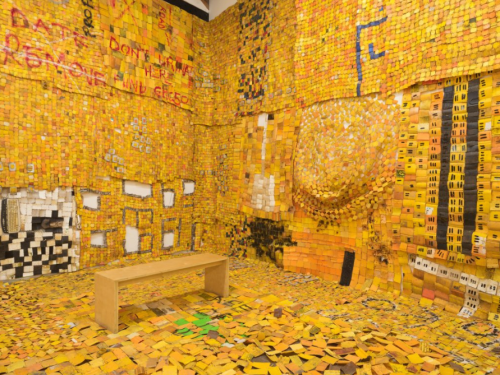
"Serge Attukwei Clottey: Routes," installation view, the Mistake Room, Los Angeles, 2019. Photo courtesy of the Mistake Room.
Coachella Officials Have Rejected a Proposal for an Ambitious Desert X Artwork, Claiming It Would ‘Exploit’ Local Plight for Tourism
This isn't the first time locals have voiced objections to a Desert X proposal.
Sarah Cascone, January 6, 2021
Desert X, Southern California’s Coachella Valley art biennial, has always confronted environmental themes head on, using the harsh desert landscape to speak to global concerns about climate change.
But during preparations for the event’s third edition, Coachella natives took umbrage with a planned installation about water insecurity by Ghanaian artist Serge Attukwei Clottey.
The city has now refused to grant permission for the project, citing ongoing problems related to arsenic-tainted groundwater in the eastern Coachella Valley. Instead, reports the Desert Sun, the work will be installed at a new, to-be-announced location.
“Ensuring that people don’t feel that their issue is being appropriated and exploited for tourism is something that is very sensitive to our communities,” council member Neftalí Galarza said during a December meeting. Desert X had been seeking a $30,000 grant for the artwork.
“We are deeply disappointed that the Coachella City Council made a decision not to host the work and troubled by the fact that the conversations it is intended to provoke proved too problematic for a district which struggles with precisely those issues,” Desert X 2021 co-curator César Garcia-Alvarez told Artnet News in an email. “It has been our hope to create meaningful exchanges between local stakeholders in the Coachella Valley and communities in Ghana who know first hand what it means to have difficulties accessing water.”
Clottey has coined the term “Afrogallonism” to describe his work, in which he recycles plastic yellow gallon containers that are ubiquitous in his native country. Originally filled with cooking oil, the containers are reused to transport water throughout Ghana, with villagers carrying the vessels long distances to reach potable wells. He transforms these containers into artworks that represent the struggles connected to Ghana’s water shortages, cutting them up and weaving them into a tapestry of sorts, or turning them into masks.
“My work aims to shed light on and create a dialogue about the challenges communities around the globe experience in their fight for equitable water resource,” Clottey told Artnet News in an email. “It’s my dream to inspire local communities with the understanding that their unique environmental conditions are shared by many people around the world.”
For Desert X, he planned to display two nine-foot-tall cubes of stacked containers overlooking the Coachella Valley, with a paved pathway of cut-up containers between them, evoking the Yellow Brick Road.
The biennial described the artwork as “an act of global solidarity” that warns “us of a coming global water crisis.”
City council members suggested the artwork would be better placed in more wealthy areas of the Coachella Valley that might not be aware of the water issues facing much of the community.
“Serge Attukwei Clottey’s practice is deeply committed to the difficult questions that emerge from histories of natural resource usage and environmental justice,” Garcia-Alvarez added. “We are excited for audiences to experience this work in a remarkable location.”
This isn’t the first time Desert X has been embroiled in controversy. Its organizers were roundly criticized for collaborating with Saudi Arabia on a 2020 exhibition following the Saudi state-sponsored murder of Saudi journalist Jamal Khashoggi in 2018.
Desert X will be on view in sites throughout the Coachella Valley, February 6–April 11, 2021.